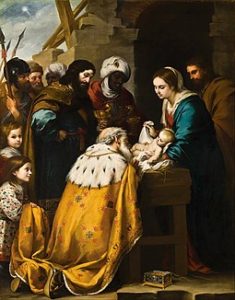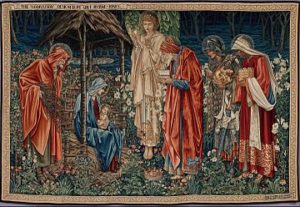 The Epiphany on 6 January celebrates when the Magi (Three Wise Kings or Three Wise Men) brought gifts of gold, frankincense and myrrh for the baby Jesus.
The Epiphany on 6 January celebrates when the Magi (Three Wise Kings or Three Wise Men) brought gifts of gold, frankincense and myrrh for the baby Jesus.
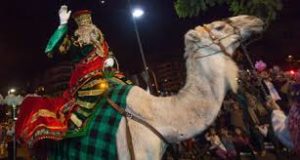 In Spain, the Epiphany is called ‘Fiesta de los tres reyes magos’. Traditionally children have some presents on Christmas Day but most are opened at Epiphany. Children believe that the Kings bring presents to them at Epiphany and they write letters to the Kings asking for toys and presents. On 5 January they leave shoes on windowsills, balconies or under the Christmas tree to be filled with presents. Gifts of a glass of cognac for each King, a satsuma and some walnuts, are left for the Kings. Sometimes a bucket of water is left for the camels that bring the Kings. If the children have been bad, the Kings might leave pieces of coal made out of sugar in the presents!
In Spain, the Epiphany is called ‘Fiesta de los tres reyes magos’. Traditionally children have some presents on Christmas Day but most are opened at Epiphany. Children believe that the Kings bring presents to them at Epiphany and they write letters to the Kings asking for toys and presents. On 5 January they leave shoes on windowsills, balconies or under the Christmas tree to be filled with presents. Gifts of a glass of cognac for each King, a satsuma and some walnuts, are left for the Kings. Sometimes a bucket of water is left for the camels that bring the Kings. If the children have been bad, the Kings might leave pieces of coal made out of sugar in the presents!
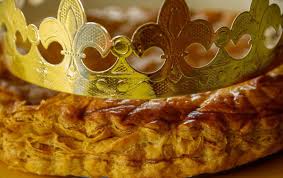 In France, l’Epiphanie’ or ‘la journée des rois’, it is traditional to eat ‘la Galette des Rois’. ‘La Galette des Rois’/Three Kings Cake is usually made of puff pastry filled with frangipane. It is also traditional to hide a small charm (called ‘fève’) in the cake. The person who finds the ‘fève’ in their slice is the King or Queen for the day. The lucky person will wear a crown for the rest of the day.
In France, l’Epiphanie’ or ‘la journée des rois’, it is traditional to eat ‘la Galette des Rois’. ‘La Galette des Rois’/Three Kings Cake is usually made of puff pastry filled with frangipane. It is also traditional to hide a small charm (called ‘fève’) in the cake. The person who finds the ‘fève’ in their slice is the King or Queen for the day. The lucky person will wear a crown for the rest of the day.
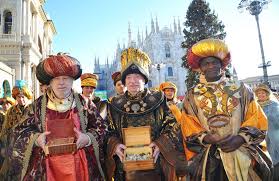 In Italy, Epiphany is a national holiday and is associated with the figure of the Befana (the name being a corruption of the word Epifania), a broomstick-riding old woman who, in the night between January 5 and 6, brings gifts to children or a lump of “coal” (really black candy) for the times they have not been good during the year. The legend told of her is that, having missed her opportunity to bring a gift to the child Jesus together with the Biblical Magi, she now brings gifts to other children on that night.
In Italy, Epiphany is a national holiday and is associated with the figure of the Befana (the name being a corruption of the word Epifania), a broomstick-riding old woman who, in the night between January 5 and 6, brings gifts to children or a lump of “coal” (really black candy) for the times they have not been good during the year. The legend told of her is that, having missed her opportunity to bring a gift to the child Jesus together with the Biblical Magi, she now brings gifts to other children on that night.

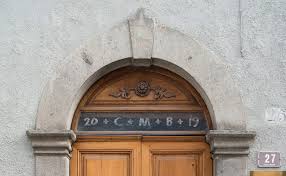
In Germany, Epiphanie (Epiphanias, Erscheinung des Herrn) is celebrated to mark the Magis (or three wise men’s) visit to baby Jesus with special church services, children dress as Star Singers and go door to door collecting treats and coins, and men travel door to door dressed as kings blessing houses with by chalking the doors C + M + B. (for the Magi, Caspar, Melchior and Balthazar) – also an abbreviation of the Latin blessing Christus mansionem benedicat, which means, May Christ bless this house.
 In Russia the Epiphany is celebrated on 19 January and marks the baptism of Jesus in the Orthodox church. The Russian Church conducts the rite of the Great Blessing of the Waters, also known as “the Great Sanctification of the Water” on that day (or the eve before). Russians traditionally celebrate the event by dunking themselves in freezing lakes or rivers blessed by Orthodox priests.
In Russia the Epiphany is celebrated on 19 January and marks the baptism of Jesus in the Orthodox church. The Russian Church conducts the rite of the Great Blessing of the Waters, also known as “the Great Sanctification of the Water” on that day (or the eve before). Russians traditionally celebrate the event by dunking themselves in freezing lakes or rivers blessed by Orthodox priests.
